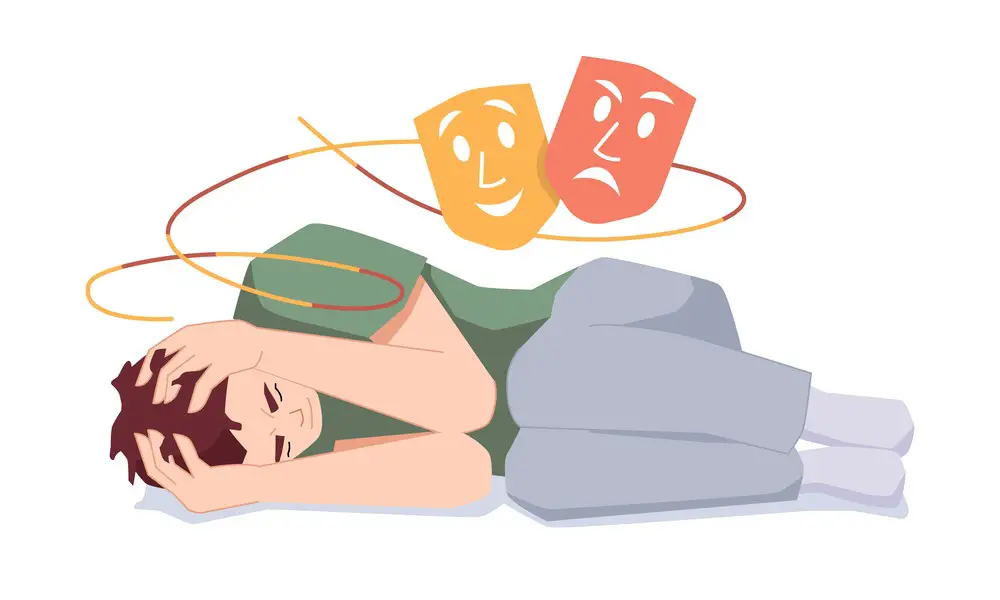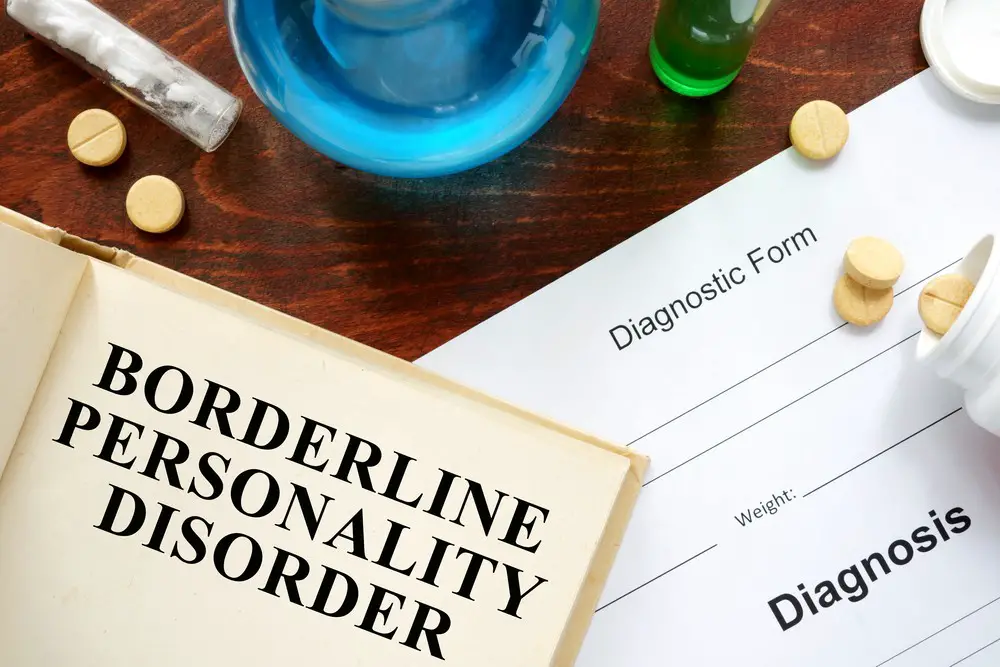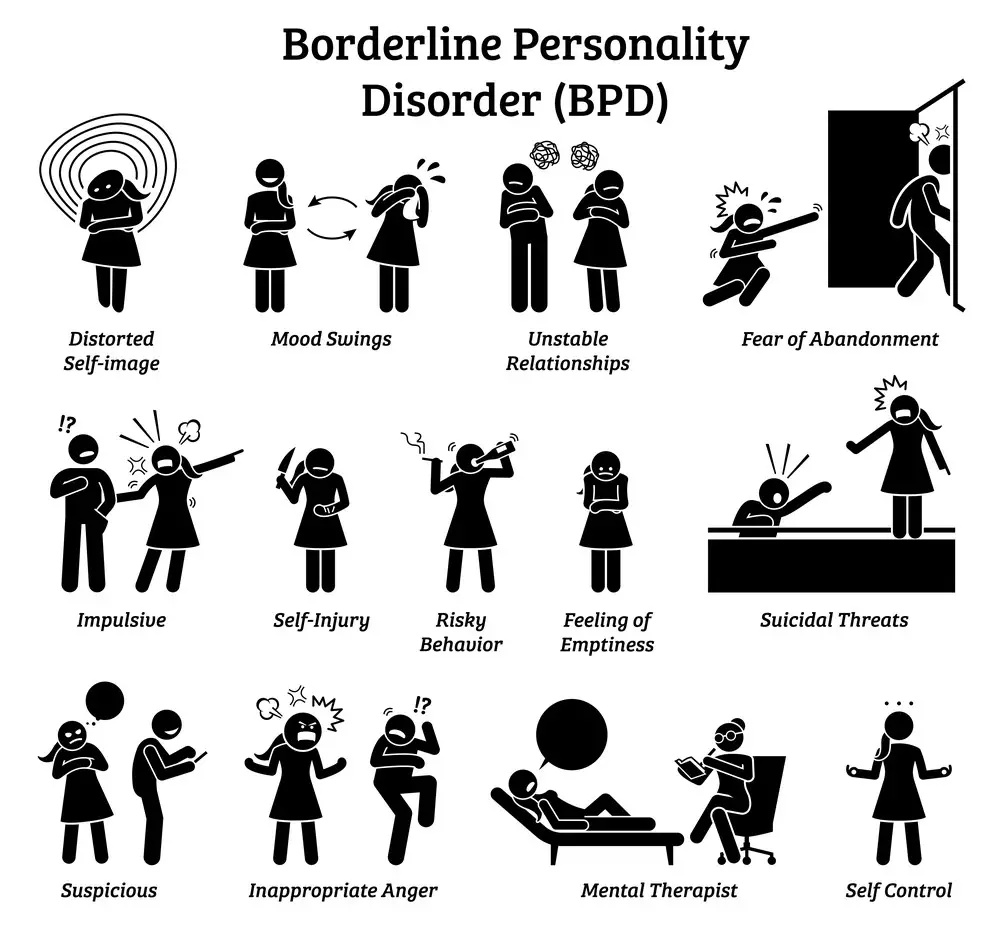As a BetterHelp affiliate, we receive compensation from BetterHelp if you purchase products or services through the links provided
Table of Contents:
- What is BPD?
- Benefits of Online Therapy for BPD
- Types of Online Therapy for BPD
- Finding an Online Therapist
- Preparing for Your First Session
- During Your Session
- After Your Session
- FAQs about Online Therapy for Bpd
- Conclusion
What is BPD?
Understanding Borderline Personality Disorder
Borderline Personality Disorder (BPD) is a complex mental health condition characterized by persistent instability in emotions, relationships, and self-image. People with BPD often face significant challenges in their daily lives due to difficulty regulating emotions and maintaining stable relationships.Symptoms
Some common symptoms of BPD include:- Intense and rapidly shifting emotions
- Unstable sense of self and identity
- Difficulty maintaining relationships
- Recurrent suicidal thoughts or self-harming behaviors
- Impulsivity and risk-taking behaviors
- Extreme fear of abandonment
- Chronic feelings of emptiness
Causes and Risk Factors
The exact cause of BPD is not fully understood, but it is believed to be a combination of genetic, environmental, and social factors. Some potential causes and risk factors include:- A family history of BPD or other mental health conditions
- Childhood abuse, neglect, or other traumatic experiences
- Brain structure and functioning abnormalities
Diagnosis
BPD can be challenging to diagnose, often because its symptoms overlap with other mental health conditions, such as bipolar disorder or major depression. A primary care doctor or mental health professional may evaluate an individual for BPD by conducting a thorough interview, reviewing medical and family history, and assessing the person’s symptoms.To be diagnosed with BPD, an individual must meet specific criteria defined in the Diagnostic and Statistical Manual of Mental Disorders (DSM-5). Confirmation of a BPD diagnosis is typically conducted by a mental health professional, such as a psychiatrist, psychologist, or clinical social worker.Treatment Options for BPD
Psychotherapy
One primary treatment for BPD is psychotherapy. A commonly used approach is dialectical behavior therapy (DBT), which focuses on teaching individuals with BPD how to manage their emotions more effectively. DBT often includes mindfulness, stress tolerance, and interpersonal communication skills. Other psychotherapy options for BPD include cognitive behavioral therapy (CBT), which focuses on challenging and changing negative thoughts and behaviors, and mentalization-based therapy (MBT), which fosters understanding of one’s own and others’ mental states.Licensed mental health professionals like therapists and psychiatrists are equipped to conduct evaluations and develop treatment plans based on an individual’s medical history and BPD symptoms. Talk therapy with a therapist can be beneficial for managing BPD-related depression, anxiety, and self-harming behaviors, while group therapy might provide additional support and coping strategies.Medication
Though no specific medication is approved solely for the treatment of BPD, some medications are effective in managing specific symptoms or co-occurring mental health disorders. Examples of medications include:- Antidepressants for depression and anxiety
- Mood stabilizers for impulsivity and emotional instability
- Antipsychotics for thought disturbances or paranoia
- Anti-anxiety medications for intense worry or panic
Hospitalization
In more severe or crises, hospitalization may be necessary to provide a safe and structured environment for individuals with BPD. This can help prevent self-harm, impulsive behavior, or other threats to the individual’s well-being. During hospitalization, medical professionals, including therapists and psychiatrists, can closely monitor the patient’s progress and adjust treatment plans as needed.Hospitalization can also serve as an opportunity to reevaluate and adjust medications or introduce new psychotherapy techniques, such as transference-focused psychotherapy (TFP), which addresses the relationship between the therapist and the patient to manage BPD symptoms better.Recap: BPD is a mental health disorder characterized by intense emotions, difficulty managing thoughts and behaviors, and struggles with relationships. Treatment options such as online therapy can help individuals learn to regulate their emotions and cope more effectively when faced with challenging situations.
Benefits of Online Therapy for BPD
Online therapy is becoming increasingly popular amongst those with Borderline Personality Disorder (BPD), providing many advantages such as convenience, affordability, privacy, and anonymity. People no longer have to leave their homes to seek help; they can access quality care anywhere with an internet connection. This makes it particularly beneficial for those living in rural areas or far away from professional resources.As well as this, many therapists offer discounted rates when providing services through video chat or phone calls, meaning that individuals can receive the same caliber of treatment at a fraction of the cost compared to traditional face-to-face counseling sessions.Security and confidentiality are crucial factors of online therapy that reputable providers take very seriously. All conversations are encrypted with advanced technology to keep patient information secure. This ensures peace of mind, knowing that their data remains confidential between them and their therapist.Numerous therapeutic tools are available online, providing additional support between meetings if needed. These tools range from self-help programs, guided meditations, and relaxation exercises to virtual reality simulations and journaling applications – all designed to help clients manage their BPD symptoms more effectively in a safe and secure setting. By using these resources, individuals can gain greater insight into their disorder while learning how to manage it daily – leading to an improved overall quality of life.Online therapy for BPD offers a range of benefits, including convenience and accessibility. Next, let’s explore the different types of online treatment available to those with BPD.Recap: Online therapy is an attractive option for those with BPD due to its convenience, affordability, and privacy. Benefits include greater flexibility in scheduling appointments; discounted rates compared to traditional counseling sessions; secure communication via encrypted technology; and the ability to access services from anywhere with an internet connection.
Types of Online Therapy for BPD
Cognitive-behavioral therapy (CBT) is one of the most popular online therapy for people with BPD. CBT focuses on identifying and changing negative thought patterns that lead to maladaptive behaviors. It also helps individuals learn coping skills, such as problem-solving and communication techniques, which can help them manage their symptoms more effectively.Dialectical behavior therapy (DBT) is another type of online therapy for BPD. DBT combines cognitive-behavioral strategies with mindfulness practices to help individuals regulate their emotions and improve their relationships with others. DBT aims to teach individuals how to accept themselves while striving for positive change in their lives.Psychodynamic therapy is a form of online counseling that focuses on exploring an individual’s past experiences to gain insight into current issues they may be facing related to BPD. In addition, this type of psychotherapy seeks to uncover unconscious motivations behind behaviors and provide a safe space for clients to express themselves freely without judgment or criticism from the therapist or other participants in the session.Mindfulness-based therapies are becoming increasingly popular forms of online counseling due to their ability to reduce stress levels and increase self-awareness among those suffering from mental health issues like BPD. Mindfulness involves focusing attention on one’s thoughts, feelings, sensations, and the environment without judgment or evaluation; this practice can help people become more aware of triggers that lead them toward unhealthy behaviors so they can better manage them in the future.Online therapy for BPD can be an effective and convenient way to receive your needed help. In the next section, we will discuss finding a qualified online therapist who is right for you.Are you struggling with Borderline Personality Disorder? Online therapy can help. Try Cognitive-Behavioral Therapy, Dialectical Behavior Therapy, Psychodynamic Therapy, or Mindfulness-based Therapies to manage your symptoms and improve your life. #BPD #OnlineTherapy Click to Tweet
Finding an Online Therapist
When looking for an online therapist, finding one who specializes in treating BPD and has experience working with this population is essential. Ensure that the therapist you choose is licensed in your state or country and has a good reputation among other professionals in the field. You can research their background by reading reviews from former clients or talking to colleagues who have worked with them.It’s also essential to ensure that the therapist understands your needs and goals regarding treatment. Ask questions about their approach, such as how they handle difficult emotions or situations, what strategies they use for coping skills, etc., to understand better whether they are a good fit for you.In addition, look into what type of technology will be used during sessions—some therapists may offer video conferencing, while others may prefer phone calls or text messaging. Be sure to ask about fees and payment options, too, so there are no surprises down the line.Finally, ensure you feel comfortable communicating with your online therapist before committing to long-term therapy plans. Both parties must trust each other for therapy to be successful; if something does not feel right, do not hesitate to look elsewhere until you find someone who meets your needs and expectations.Finding an online therapist can be a great way to get your needed help in a safe and convenient environment. With the proper preparation, your first session will be a positive experience.When looking for an online therapist, make sure they specialize in treating BPD and have experience with this population. Ask questions about their approach & technology used during sessions, fees & payment options to ensure you find the right fit. #onlinetherapy #BPD Click to Tweet
Preparing for Your First Session
Before beginning online therapy, preparing yourself mentally and emotionally is essential. Setting realistic goals for yourself can help you stay focused on the process and ensure that your expectations align with what you want to achieve from the sessions. Additionally, being honest about your feelings and experiences can help your therapist better understand how they can best support you.It is also essential to ensure a comfortable space where you can focus on your session without distractions or interruptions from others around you. This could be a quiet room in your home or even a local library or cafe if it helps create an environment of peace and solitude for you. In addition, access to this kind of space will ensure that nothing disrupts the conversation between yourself and your therapist during each session.Finally, take some time before each session to think about what topics or issues may arise during the discussion so that both parties are prepared when starting each appointment. Writing down any questions or concerns ahead of time will allow both parties involved in the conversation to get right into discussing them as soon as possible once the session begins. Doing this will also help keep conversations organized and focused on specific topics throughout each appointment, making tracking progress easier for everyone involved.Coming prepared for your first session is essential, as it will help ensure you get the most out of your online therapy experience. Now that you have taken the time to prepare let’s move on to discussing what happens during your session.Ready to start online therapy for BPD? Here are some tips to help you prepare: Set realistic goals, create a comfortable space, and write down any questions or concerns before each session. #onlinetherapy #BPD Click to Tweet
During Your Session
Being open and honest during your online therapy session for BPD is essential. Your therapist needs to understand what you are going through to provide the best guidance possible. In addition, taking notes during each session can help me remember what was discussed later on when needed.Be sure to communicate any changes in your mental health or emotional state since the last session and any new thoughts or feelings that have come up since then. This will help your therapist better understand your actions and allow them to adjust their approach accordingly.During the session, it is also essential for you to ask questions if something isn’t precise or if there is something else that needs clarification. Don’t hesitate to speak up about anything that comes up while talking with your therapist; they are there specifically for this purpose and want nothing more than to feel comfortable enough with them so that they can help guide you toward recovery from BPD symptoms.Your online therapy sessions should also include some goal-setting activity where you and your therapist decide on achievable goals based on where you currently stand regarding the progress made thus far. These goals should focus on improving current symptoms and developing strategies for preventing future episodes from occurring again once treatment has ended successfully.Finally, both parties involved in an online therapy session (you and your therapist) must remain respectful throughout each appointment – even if disagreements arise between yourselves over specific topics being discussed within said sessions. Respectful communication will ensure that you can get the most out of your online therapy sessions and make progress toward recovery from BPD symptoms.During your session, you and your therapist will discuss the best strategies to manage your symptoms of BPD. Afterward, you can review the steps taken during the session and develop an action plan for continuing progress.Recap: Key takeaway: Respectful communication and goal-setting are essential for successful online therapy sessions for BPD. Make sure to • Be open and honest with your therapist • Take notes during each session • Ask questions if something isn’t clear • Set achievable goals together.
After Your Session
After each session, it is essential to take some time to reflect on what was discussed. This can help you better understand the insights and strategies that your therapist suggested during the session. Taking this time for reflection can also help you identify any areas of progress or growth since your last appointment and any potential challenges or obstacles that may need further attention in future sessions.It is also helpful to write down any new ideas or techniques discussed during the session so that you can refer back to them later when needed. Doing this will allow you to recall these points more and put them into practice between sessions if necessary.Additionally, it is beneficial to set aside a few minutes after each session for self-care activities such as taking a walk outside, reading a book, listening to music, writing in a journal, etc. These activities can help ground yourself and process the information from the session before moving on to other tasks or activities.Finally, if any action items are assigned by your therapist (such as completing an exercise or activity), be sure to note those and follow through with them accordingly for therapy sessions to remain productive and successful over time. Then, after each appointment with your online therapist for BPD treatment, you can set yourself up for success now and in future sessions.Does Online Therapy Work?
Online therapy has become increasingly popular recently, with many people turning to it as an alternative to traditional face-to-face therapy. But does online therapy work? The answer is yes. Studies have shown that online therapy can be just as effective as conventional therapies for various mental health issues, including depression, anxiety, eating disorders, and post-traumatic stress disorder.One study even found that online therapy helped reduce symptoms of impulsivity and emotional instability associated with Borderline Personality Disorder. However, it’s essential to find a therapist experienced in treating the condition before beginning any treatment. Additionally, suppose you need more support than online therapy can provide or have difficulty staying motivated during sessions. In that case, traditional face-to-face sessions may better suit your needs.The great thing about online therapy is that it provides flexibility and convenience not available through other forms of treatment. For example, you don’t have to worry about taking time off from work or school or dealing with traffic on your way to an appointment; instead, you can access quality care from the comfort of your home at whatever time works best for you. Plus, there are often no wait times involved – meaning you can get help when you need it most without waiting weeks or months for an appointment slot.If you think online therapy might be right for you but aren’t sure where to start looking, give one of our mental health counselors a call today at 833-957-2690. BPD Treatment Resources
BPD Treatment Resources
Are you struggling with borderline personality disorder (BPD)? You’re not alone. BPD is a mental health condition that affects millions of people worldwide. Fortunately, treatment options are available to help manage the symptoms and improve the quality of life.One such option is Dialectical Behavior Therapy (DBT). Developed by Marsha M. Linehan, Ph.D., DBT is a cognitive behavioral therapy designed specifically for those with BPD. It focuses on helping individuals learn how to regulate their emotions and behaviors to better cope with difficult life situations or stressors. To find out more about DBT or locate a therapist who specializes in this type of therapy, visit www.behavioraltech.org for more information and resources on DBT training offered around the world as well as lists of therapists providing this type of care near youAnother excellent resource for finding mental health professionals specializing in BPD treatment is the Borderline Personality Resource Center at www.bpdresourcecenter .org or call 914-682-5496. This free referral center has an extensive list of providers across the country who can provide specialized care tailored to your individual needs regarding managing your symptoms associated with BPD and improving your overall quality of life through various evidence-based treatments like psychotherapy, medication management, etc.Finding support doesn’t have to be overwhelming. With these resources available online and over the phone, getting started on your journey toward recovery can be made more accessible than ever before.FAQs
What type of therapist is best for BPD?
The best type of therapist for Borderline Personality Disorder (BPD) is a Dialectical Behavior Therapy (DBT) practitioner. DBT is an evidence-based treatment designed to help individuals with BPD manage their emotions, build interpersonal skills, and reduce self-destructive behaviors. It combines cognitive behavioral therapy with mindfulness techniques to help clients learn how to regulate their emotions and tolerate distress in healthier ways. DBT practitioners are trained in the skills necessary to provide effective treatment for BPD, including validation, problem-solving, emotion regulation, and distress tolerance.How do I treat my BPD myself?
The best way to treat Borderline Personality Disorder (BPD) is through psychotherapy and medication. Psychotherapy can help you learn new skills for managing emotions, improving relationships, and reducing stress. Medication may relieve symptoms such as depression or anxiety associated with BPD. Self-care strategies like regular exercise, healthy eating habits, adequate sleep, and relaxation techniques can also help manage your symptoms. To ensure the most effective treatment plan for your needs, it is essential to seek professional support.How do I get over my FP BPD?
Getting over a fear of abandonment due to Borderline Personality Disorder (BPD) can be complex, but it is possible. The first step is to seek professional help from a mental health specialist such as a psychologist or psychiatrist. They will be able to provide you with the necessary tools and strategies needed to overcome your fears. Additionally, engaging in activities that promote self-care and relaxation can help reduce anxiety associated with BPD. These activities could include yoga, meditation, journaling, art therapy, exercise, and outdoor time. Finally, building supportive relationships with family members and friends who understand your condition can give you the strength and courage needed to overcome this disorder.Can BPD be diagnosed online?
No, BPD cannot be diagnosed online. Diagnosing a mental health disorder like BPD requires an in-person assessment with a qualified mental health professional. This assessment includes interviews and reviews to determine the presence of symptoms associated with the disorder. Online therapy can support people living with BPD, but it is insufficient to diagnose this condition.Conclusion
Online therapy for BPD can be a great way to get the help you need without having to leave your home. It is essential to find an experienced therapist who understands your needs and can provide you with the right type of therapy. With preparation, support, and guidance from a qualified professional, online therapy for BPD can be a valuable tool in managing symptoms and improving overall mental health.
Latest posts by Jacob Maslow (see all)
Images Courtesy of DepositPhotos
This site contains affiliate links to products. We will receive a commission for purchases made through these links.
This site contains affiliate links to products. We will receive a commission for purchases made through these links.





 BPD Treatment Resources
BPD Treatment Resources
